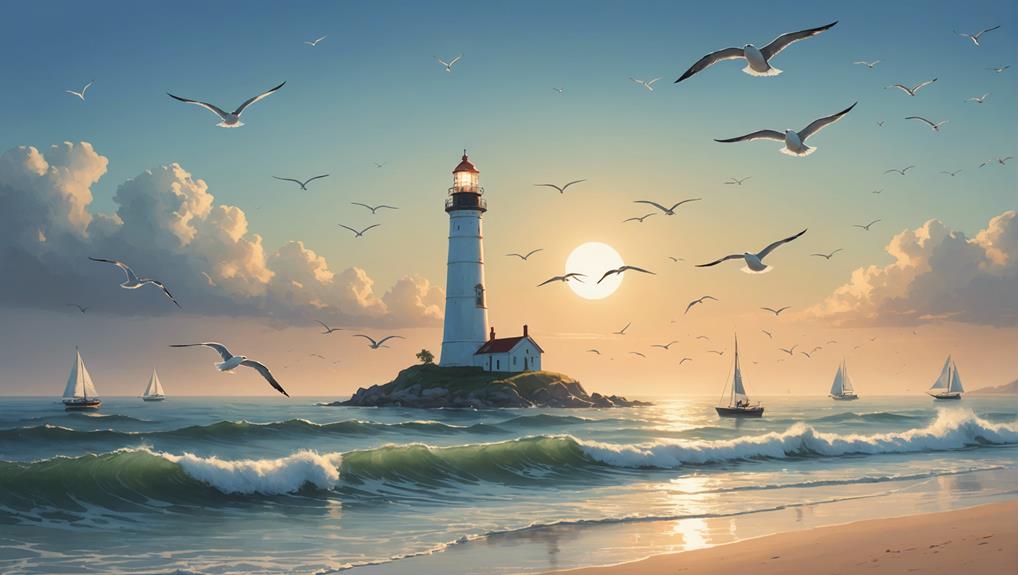Summary
When reflecting on the 'coast', consider it as the point where the land dances with the sea, creating ecosystems and influencing climate and biodiversity. This intersection is not just about waves; it is a vital center, from housing to economic activities. But wait, there is more to discover about this intersection of land and water.
The literal definition of 'coast'

When you think of the coast, you are imagining the place where the land meets the sea. It is a crucial and ever-changing boundary where two distinct worlds collide. The term 'coast' refers to the strip of land bordering an ocean, sea or other large body of water. This area is influenced by tides, waves and marine life, creating a unique ecosystem that supports a wide range of flora and fauna.
The coast is not just a physical location; it has enormous ecological, economic and cultural importance. It serves as habitat for various species, as a source of livelihood for communities dependent on fishing and tourism, and as a place of recreation and relaxation for many. In addition, the coast plays an essential role in regulating weather patterns and protecting inland areas from the impacts of extreme weather events.
Understanding the literal definition of 'coast' is crucial to appreciating the complex relationship between land and sea. It highlights the interconnectedness of these environments and underscores the importance of preserving the delicate balance that exists along our coasts.
Coastal erosion and the environment
As we investigate coastal erosion and its impact on the environment, it becomes apparent that the dynamic forces at play along the coast pose significant challenges to the delicate balance of coastal ecosystems. Coastal erosion, the wear and tear on the land by natural forces such as waves and currents, can lead to the loss of beaches, reefs, and habitats essential to various species.
The consequences of coastal erosion go beyond the physical landscape. Eroding coastlines can result in the destruction of nesting sites for seabirds, disruption of marine life habitats, and increased vulnerability to flooding for coastal communities. In addition, the removal of protective coastal vegetation and dunes due to erosion can make inland areas more susceptible to storm surges and extreme weather events.
Understanding and addressing coastal erosion is critical to preserving the biodiversity and resilience of coastal environments. Strategies such as beach nourishment, dune restoration, and implementation of breakwaters can help mitigate the impacts of erosion and safeguard the delicate balance of coastal ecosystems for future generations to enjoy.
Coastal life and lifestyle

Living near the coast offers a unique opportunity to immerse yourself in a lifestyle shaped by the rhythms of the sea and the beauty of the coast. The experience of coastal living is a mix of relaxation, adventure and connection with nature. Here are five aspects that make coastal living truly special:
- Breathtaking views: Wake up with the view of the sun rising over the ocean or enjoy colorful sunsets on the beach.
- Outdoor activities: Participate in water sports such as surfing, kayaking or simply strolling along the sandy shores.
- Fresh fish: Delight in delicious and fresh seafood caught locally and enjoy dinners by the sea.
- Community atmosphere: Embracing a close-knit coastal community that celebrates the relaxed lifestyle and fosters a sense of belonging.
- Wellness benefits: Breathe in the fresh sea air, listen to the soothing sounds of the waves, and experience a feeling of peace and regeneration.
Immerse yourself in coastal life and welcome the unique charm it brings to everyday life.
Floating through life metaphor
Embarking on life's journey can be compared to coasting along the shore, where the tides of experience float by, shaping your path with their gentle but powerful influence. Just as the shoreline is shaped by the constant movement of the ocean, your life journey is shaped by the ups and downs you encounter along the way. Sometimes you might find yourself gliding gently, feeling the wind in your sails and the sun on your face, moving forward with ease. At other times, you might encounter rough waters, challenging currents that test your resolve and push you to maneuver with skill and resolve.
The metaphor of coasting through life reminds us that while there are times of tranquility and serenity, there are also times of turbulence and uncertainty. Embracing the fluctuations, the calm and the storm, is part of the beauty of travel. Just like a ship riding the waves, you learn to adapt, to chart a course toward the horizon even when the waters are rough. So as you sail along the shores of your existence, remember that each experience, whether smooth or challenging, is shaping you into the resilient and wise navigator you are destined to become.
Coast as a verb: Effortless progress

Traveling through life, "coasting" can symbolize the concept of effortless progress, where you move forward with ease and grace, embracing the natural flow of the journey. When you "coast," you glide effortlessly through challenges and obstacles, allowing the momentum to carry you forward. It's about finding that sweet spot where you are in tune with your surroundings, effortlessly propelling you toward your goals. Here are five key aspects to help you understand the beauty of "coasting" through life:
- Embracing the Present: "Coasting" allows you to focus on the present moment, appreciating the journey instead of just the destination.
- Confire in the Process: "Coasting," you learn to trust that things will develop as they should, guiding you toward the desired results.
- Adapting to Change: "Coasting" teaches you to adapt to changes smoothly, adjusting your pace without losing momentum.
- Finding Balance: It's about finding the balance between effort and ease, knowing when to push forward and when to let go.
- Enjoying the Journey: "Coasting" reminds you to enjoy the journey, savoring every moment on the way to your dreams.
Frequently asked questions
How do tides affect the coast?
Tides influence the coast by causing water levels to rise and fall regularly. The high tides bring more water to the shore, potentially causing flooding and erosion. The low tides expose more of the shoreline, affecting marine life and recreational activities. Tidal comings and goings also play a role in shaping the coastal landscapes over time. Understanding how tides affect the coast is essential for coastal communities and ecosystems to adapt and thrive.
What are some popular coastal activities?
When you head to the coast, there is a world of activities waiting for you! From relaxing on sandy beaches and tanning in the sun to surfing waves and exploring tide pools, coastal areas offer a variety of fun things to do. You can also try fishing, kayaking or simply enjoy a scenic coastal walk. Whether you are looking for adventure or relaxation, the coast has something for everyone to appreciate!
Can coastal erosion be prevented?
Yes, coastal erosion can be prevented through various methods. Building breakwaters, planting vegetation to stabilize the soil, and implementing beach nourishment projects are effective ways to combat erosion. It is essential to understand the causes of erosion in specific coastal areas to develop targeted prevention strategies. By taking proactive measures and working with coastal management experts, you can help protect these valuable natural environments from the damaging effects of erosion.
What wild animals can be found along the coast?
Along the coast, you can explore a wide range of wildlife. From seabirds as gulls and pelicans to the marine mammals as seals and dolphins, coastal regions are rich with life. Crabs snap along sandy shores while the sea turtles They nest in the dunes. Keep an eye out for colorful fish darting through the shallow waters and majestic whales surfacing offshore. The coast is a vibrant ecosystem full of fascinating creatures to observe and appreciate.
Are Coastal Communities at Risk from Climate Change?
Are coastal communities at risk from climate change? Absolutely. Rising sea levels, more severe storms, and coastal erosion all pose significant threats. As global temperatures rise, these risks intensify. It is essential that coastal residents adapt and prepare for these challenges. Building resilience through sustainable practices and infrastructure can help mitigate the impacts of climate change and protect these vulnerable communities in the long run. Stay informed and proactive to protect your coastal home.
